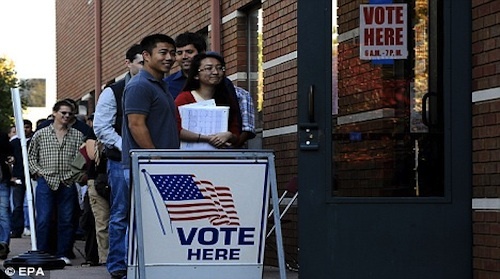Study: 1 in 3 Asian-American voters is undecided

By Khalil Abdullah, New America Media
Asian Americans have been trending Democratic in their voting patterns but remain highly independent in party allegiances, according to a newly released survey. In 1992, less than one-third of Asian Americans for the Democratic presidential candidate but more than two-thirds voted for Obama in 2008.
Today, 33 percent now identify themselves as Democrats, 14 percent are Republicans, and two percent cite some other affiliation.
The other 32 percent of likely voters remains undecided in their choice for president.
Despite the upward Democratic trend and the 2008 vote for Obama, the majority of Asian Americans, 51 percent, now consider themselves non-partisan.
The longitudinal shift to the Democratic Party is one of the most important stories of the immigrant electorate, according to Karthick Ramakrishnan, University of California-Riverside, who, with co-author, Taeku Lee, University of California-Berkeley, released two studies: Public Opinion of a Growing Electorate: Asian Americans and Pacific Islanders in 2012; and The Policy Priorities and Issue Preferences of Asian Americans and Pacific Islanders.
"Politically speaking, Asian Americans nationally do not enjoy the same kind of attention as African Americans and Latinos do," Ramakrishnan said.
Survey data showed that one-third of the Asian-American adult population resides in California. That, combined with the Asian-American populations of New Jersey, New York, and Texas, accounts for 60 percent of the U.S. Asian American populace. None of the four is considered a battleground state. Most pollsters deem California, New Jersey, and New York as committed to the Democratic presidential candidate; Texas is expected to vote for the Republican.
Yet, as Ramakrishnan noted, the population of Asian Americans is growing in three swing states, Nevada, North Carolina, and Virginia, and their votes have the potential to tip the scale for either political party. He estimated that an additional 600,000 Asian-American voters would likely participate nationally in this year’s election, about as many new voters as they added in 2008.
Still, the trend toward Democrats is not universal among Asian Americans. The data show that Filipino-American voters, who are heavily concentrated in California, are for the first time favoring Romney over Obama. Indian-Americans, on the other hand, are more likely to vote Democratic, a finding that took one Indian-American journalist at the event by surprise. He questioned whether Indian doctors and lawyers, for example, were really more inclined to vote Democratic when, in his opinion, the Republican Party has been more representative of business and conservative values typically associated with the Indian-American professional class.
Ramakrishnan double-checked his data from the podium and said he stood by his research. In an earlier statement he noted that "Indian-Americans are the most left leaning of Asian-American groups… on a host of issues and also in terms of their political orientations."
The question about how immigrants are perceived within American culture, and by each other, was at the core of both reports. "It is also important," Ramakrishnan said, "to pay attention to the foreign-born populations within the Asian-American population."
Differences are evident, for example, in the health care debate. "Among the various ethnic groups, support was highest among Vietnamese and Korean-Americans for the Affordable Care Act," Ramakrishnan said, adding, "This makes sense because you have high rates of un-insurance among Korean-Americans" even though their income and education levels are competitive with other Americans. He noted also the level of support for the Affordable Care Act among Vietnamese-Americans was similar to that of other Asian Americans, but declined when the law was termed "Obamacare."
Ramakrishnan said past political loyalties are the likely reason for the difference in answers on this issue among Vietnamese who have tended to support the Republican Party, though that support too is beginning to ebb.
Overall, however, Asian-Americans have a higher level of support for the Affordable Care Act than Americans generally, regardless of what it is called.
They also identify themselves as environmentalists. Each ethnic group included in the survey -- Chinese, Cambodian, Hmong, Indian, Japanese, Korean, Native Hawaiians, Samoans, and Vietnamese – met or far surpassed the 42 percent identification stated by other Americans.
Still, how questions are framed can yield different results. At 78 percent, Asian Americans show stronger support for affirmative action than the average American population. That support waned when the question was posed as a measure of their support to achieve diversity; but increased when presented as a means for minorities to obtain better jobs and education.
Held at the Woodrow Wilson Center, the forum's panelists included Deepa Iyer, chair of National Council of Asian Pacific Americans (NCAPA) and executive director of South Asian Americans Leading Together (SAALT); Mee Moua, president of Asian American Justice Center (AAJC); and Miriam Yeung, executive director of the National Asian Pacific American Women's Forum (NAPAWF). Their overarching message was that Asian Americans are not only varied in their ethnic and social outlooks, but that in terms of electoral politics, politicians who continue to ignore these voters do so at their own risk.
Beyond using the authors' research as a guide to understand Asian-American political evolution or as a roadmap to harness political power, panelists emphasized the need for Asian-American organizations to use the information to improve the work within their communities.
"The most harmful mythical creation about our community has been the model minority myth," said Yeung. "We are a community of contrasts; we cannot be monolithically portrayed."
